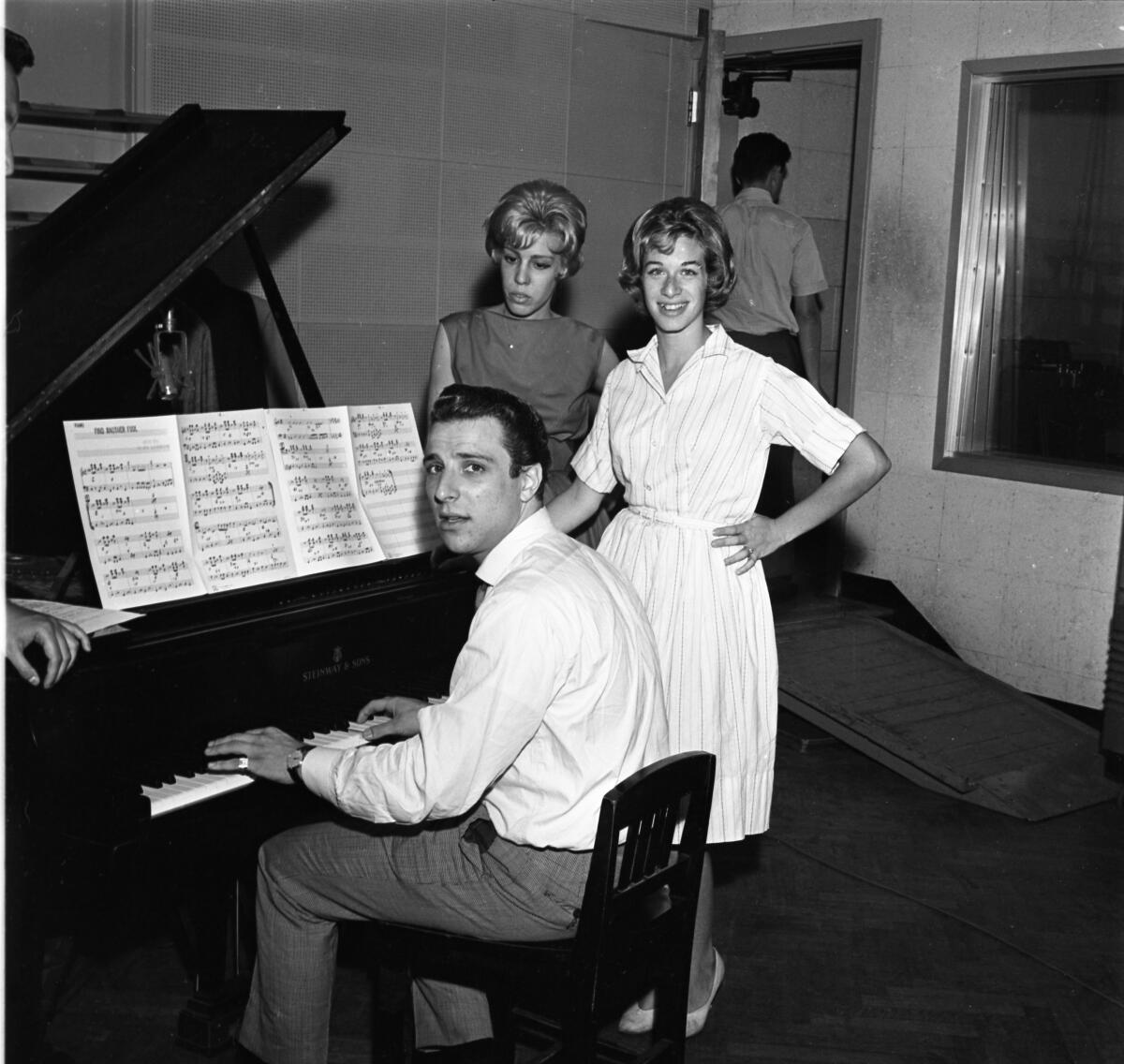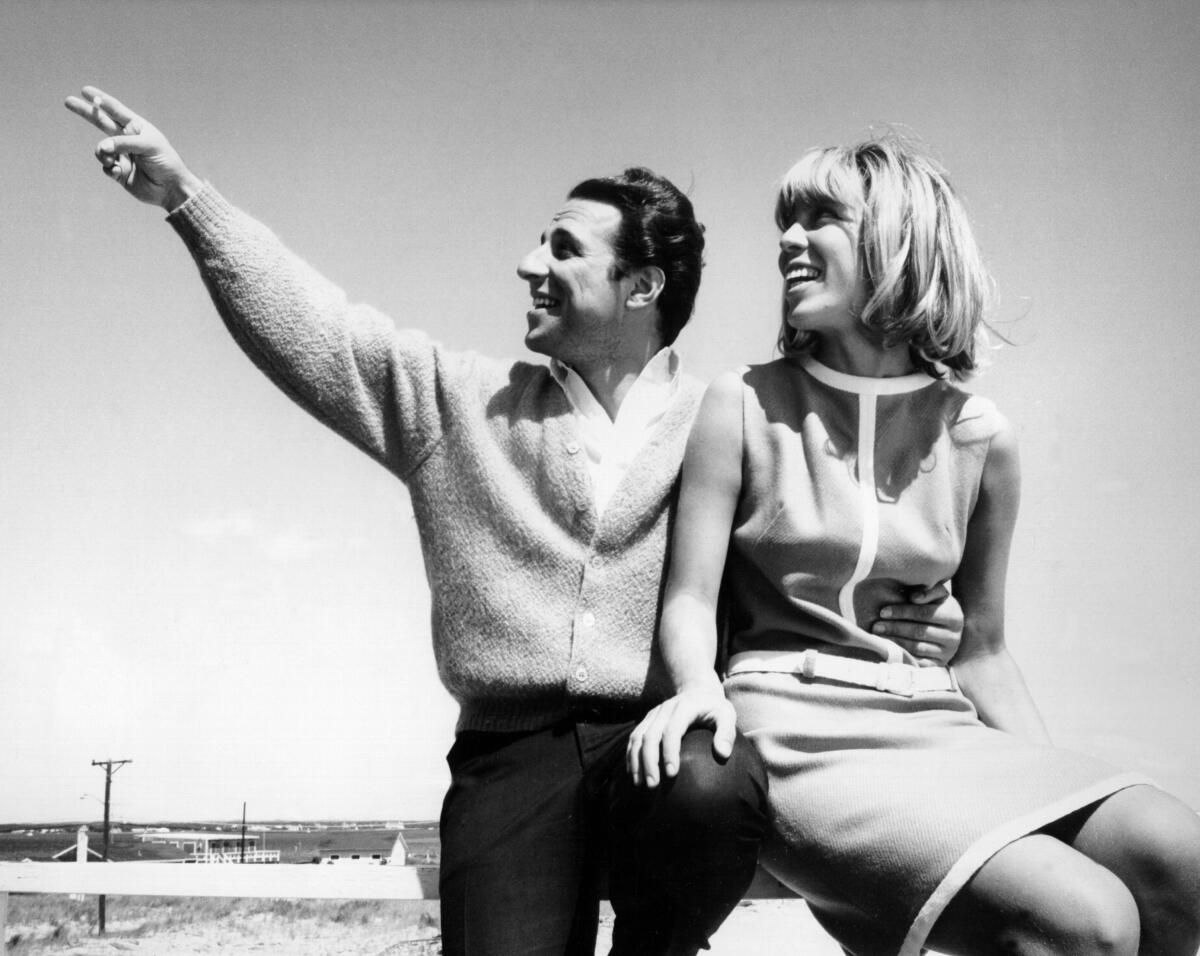Cynthia Weil, ‘You’ve Lost That Lovin’ Feelin’’ co-writer, dies at 82

- Share via
Cynthia Weil, one of the major pop songwriters associated with the Brill Building sound of the early 1960s, died Thursday at her home in Beverly Hills. She was 82.
Her daughter, Dr. Jenn Mann, confirmed Weil’s death. No cause of death was given.
Weil spent nearly four decades writing hit singles that spanned a variety of genres, many of which turned into enduring standards. Most of these songs were written in partnership with Barry Mann, the fellow songwriter Weil married in 1961, who was at her bedside when she died.
Jenn Mann wrote in a statement to The Times, “When people imagine Cynthia Weil they see the mega-hits she wrote with my father, the Grammys she won, being inducted into the Rock & Roll Hall of Fame and the Songwriter’s Hall of Fame and her life portrait in the Carole King musical ‘Beautiful.’ We remember the incredible loving wife, mother, grandmother and mother-in-law she was. She was tough, brilliant, funny, fiercely loyal and beautiful.”

With Mann composing the music and Weil penning lyrics, the pair wrote songs that helped shape the sound and sensibility of the 1960s and beyond. The duo, working mostly a few blocks from the actual Brill Building, at 1650 Broadway, was responsible for girl-group classics such as the Crystals’ ”He’s Sure the Boy I Love” and the Ronettes’ ”Walking in the Rain,” the smooth uptown R&B of the Drifters’ ”On Broadway,” the Righteous Brothers’ operatic “You’ve Lost That Lovin’ Feelin’” and “(You’re My) Soul and Inspiration” and the baroque pop of Cass Elliot’s “Make Your Own Kind of Music.” Unlike some of their peers, Weil and Mann had a knack for harder-edged material as well, as heard on the Animals’ ”We’ve Gotta Get Out of This Place” and Paul Revere & the Raiders’ ”Kicks” and “Hungry.”
Weil and Mann also managed to survive the transition from the ’60s to the ’70s with relative ease, gravitating toward adult-oriented pop. In 1977, they gave Dolly Parton her first crossover pop hit in the form of the ebullient “Here You Come Again,” kickstarting a second golden age for the songwriting team that featured such soft-rock hits as Quincy Jones and James Ingram’s “Just Once,” Linda Ronstadt and Aaron Neville’s “Don’t Know Much” and Sergio Mendes’ “Never Gonna Let You Go.” The period culminated with “Somewhere Out There,” a Ronstadt and Ingram duet that won the Grammy for song of the year in 1988.

During this period, Weil stepped away from Mann to co-write “He’s So Shy” for the Pointer Sisters and “Running With the Night” with Lionel Richie.
On Facebook, Brill Building-era peer and longtime friend Carole King wrote, “Cynthia’s high professional standard made us better songwriters.”
Barry Mann wrote in a statement, “I’m a lucky man. I had two for one: my wife and one of the greatest songwriters in the world, my soul and inspiration.”
From Brill Building-era classics to ‘80s quiet-storm staples, Weil’s songs, many written with husband Barry Mann, became part of the fabric of American life.
The daughter of Lithuanian-Jewish immigrants, Cynthia Weil was born on Oct. 18, 1940, in New York City. Raised on the Upper West Side, Weil harbored dreams of working in the theater when she was an adult. Initially trained as an actress and dancer, Weil gravitated toward music. After supporting herself in college by singing showtunes in nightclubs, she wound up at the publishing company owned by Broadway songwriter Frank Loesser. After a stint with Loesser’s organization, she was hired as a staff writer at Al Nevins and Don Kirshner’s Aldon Music, a publisher housed at 1650 Broadway, just a short distance from Times Square.
Aldon Music was one of many publishing houses whose output formed “the Brill Building sound,” a term used as shorthand for the sophisticated pop and R&B tunes crafted by professional songwriters working at offices scattered along Broadway. Collectively, this scene was the incubator for some of the greatest songwriting talents of the postwar era. Among Weil’s peers were King and Gerry Goffin, Jerry Leiber and Mike Stoller, Neil Diamond, Neil Sedaka, Shadow Morton, Otis Blackwell, Ellie Greenwich and Jeff Barry, plus Barry Mann, an Aldon staffer who had a Top 10 hit as a performer with “Who Put the Bomp (in the Bomp, Bomp, Bomp).” Weil was collaborating with Teddy Randazzo when Mann played a song for his colleague; she later said, “I saw him and it was all over for me.” Weil and Mann developed a professional relationship that quickly turned romantic; they married in 1961.

At first, Weil and Mann split their time between writing for teen idols, TV actors with singing aspirations and R&B vocalists, honing chops they deployed on the girl-group classics they wrote for producer Phil Spector. Weil later told NPR’s Terry Gross, “I somehow felt that my girl-group lyrics — except for ‘Walking in the Rain,’ which was really adolescent — they were just a little sharper.” Weil’s increasing lyrical acumen spurred her to tackle more serious subjects, such as on “Only in America,” a civil-rights protest song intended for the Drifters but released by Jay & the Americans because co-writer Jerry Leiber convinced the duo that radio would never play the song if it was sung by a Black group.
Weil and Mann’s increasing sophistication as composers could be heard on “You’ve Lost That Lovin’ Feelin’,” a stately ballad that blended melodramatic pop and smooth soul. The combination of Spector’s thundering production and the Righteous Brothers’ passionate performance turned “You’ve Lost That Lovin’ Feelin’” into a crossover hit in early 1965, but the song would outlast its era. Numerous covers followed, including versions by Dionne Warwick and Daryl Hall & John Oates, while the original Righteous Brothers single reentered the charts in 1990 after its appearance in the movie “Ghost.” The music publishing organization BMI named “You’ve Lost That Lovin’ Feelin’” as the song that was played most often on American radio and television during the 20th century.
Weil and Mann continued to write for the Righteous Brothers, the Drifters and the Ronettes through the mid-’60s, but they also branched out into harder rock ’n’ roll beginning with “We Gotta Get Out of This Place,” a tense hit from British Invasion band the Animals in 1965. “Kicks” and “Hungry,” the pair of Top 10 hits they penned for Paul Revere & the Raiders in 1966, were the culmination of this trend. By the end of the ’60s, they were writing gentler, folk-tinged numbers and, with B.J. Thomas’ “I Just Can’t Help Believing,” moving toward the adult-oriented soft rock that became their signature in the following decades.
Davies leads a guided tour through his band’s catalogue of classic hits, near-hits and the songs that makes him think about his mum and dad.
The pair worked steadily throughout the 1970s, having the occasional sizable hit like Thomas’ “Rock and Roll Lullaby” in 1972, but it was Parton’s “Here You Come Again” that revived their fortunes in 1977. The pop song helped push open the door to a country audience they began courting with Johnny Rodriguez’s 1974 country hit “We’re Over,” yet Weil and Mann also cultivated a quiet-storm R&B audience, writing hits for Quincy Jones and James Ingram (“Just Once”) and Deniece Williams (“Black Butterfly”). Weil pursued this path when she wrote songs separately from Mann in the early ’80s. Working with Tom Snow, she had hits with the Pointer Sisters (“He’s So Shy”) and Peabo Bryson (“If Ever You’re In My Arms Again”), and collaborated with Richie on his hit “Running With the Night.”
Weil and Mann teamed with film composer James Horner to write the ballad “Somewhere Out There” for the 1986 animated film “An American Tail.” As performed by Linda Ronstadt and James Ingram, “Somewhere Out There” became a major hit, garnering Grammys for song of the year and song written specifically for a motion picture or television; it was nominated for original song at the Academy Awards. The success of “Somewhere Out There” led to Weil and Mann working regularly in motion pictures. They reunited with Horner for “Whatever You Imagine” from the 1994 fantasy film “The Pagemaster,” wrote the songs for Ron Howard’s 2000 live-action adaptation of “How the Grinch Stole Christmas,” and collaborated with John Williams on “For Always,” a song from Steven Spielberg’s 2001 film, “A.I.”

Weil and Mann started to retreat from the pop charts in the 1990s. Weil wrote Vanessa Williams’ “Just for Tonight” with Keith Thomas in 1992, then had her last charting hit when “Wrong Again,” a song she wrote with Tommy Lee James, became a No. 1 country hit for Martina McBride in 1998. Hanson’s 1997 “I Will Come to You” was the last charting pop hit she co-wrote with Mann.
In lieu of pop hits, Weil pursued other creative outlets. Mann and Weil opened “They Wrote That?,” a stage production in which Weil told stories while Mann sang tunes from the couple’s songbook, in New York City in 2004. The pair wrote music for a 2008 stage adaptation of Peter Bogdanovich’s film “Mask.” Weil and Mann also both wound up as characters in “Beautiful: The Carole King Musical,” which debuted on Broadway in 2014.
Weil launched a parallel career as an author in the 2010s with “Rockin’ Babies,” a children’s book written with her daughter, Jenn. She wrote two more novels, as well as the script for the 2006 Lifetime thriller “The Stranger Game.”
Weil was inducted into the Songwriters Hall of Fame in 1987. She received the Ahmet Ertegun Award from the Rock and Roll Hall of Fame in 2010.
Weil is survived by her husband, Barry; daughter Jenn; and grandchildren Quin and Mendez Berman.
More to Read
The biggest entertainment stories
Get our big stories about Hollywood, film, television, music, arts, culture and more right in your inbox as soon as they publish.
You may occasionally receive promotional content from the Los Angeles Times.












